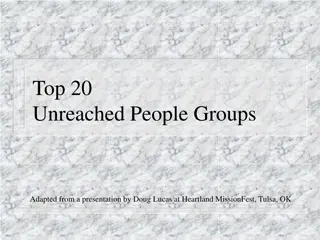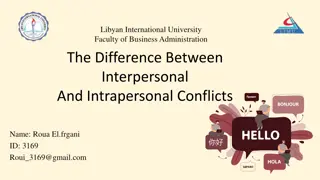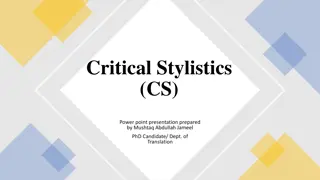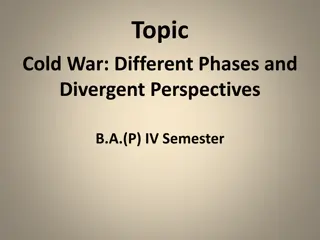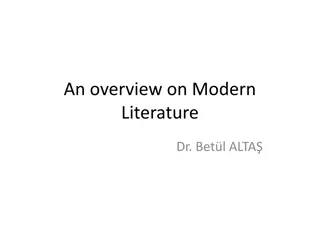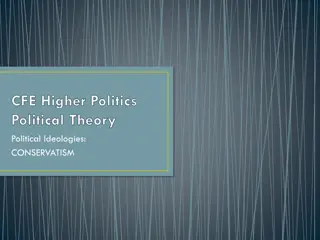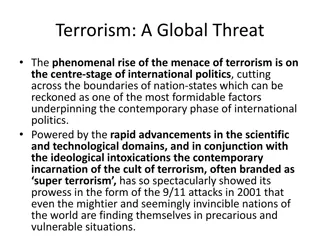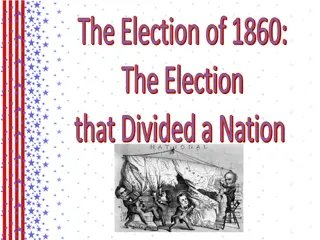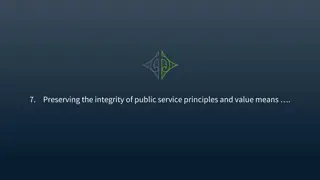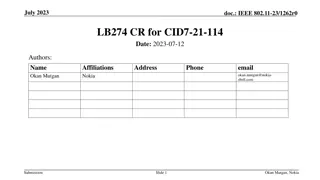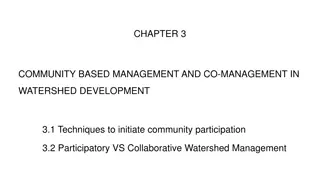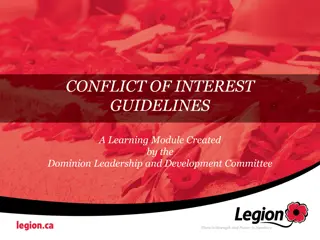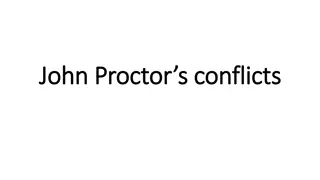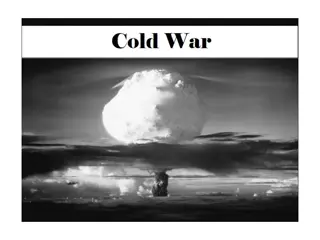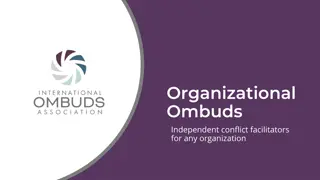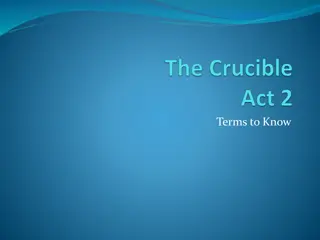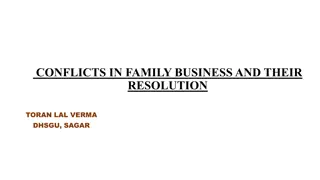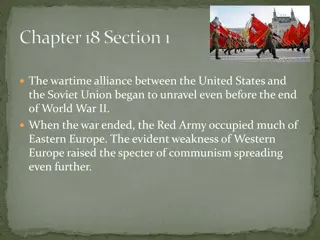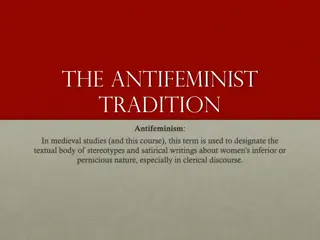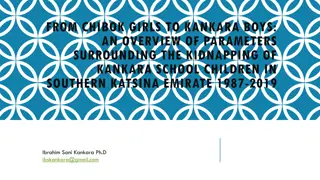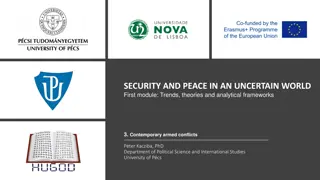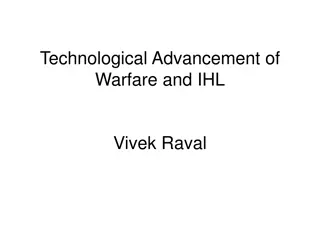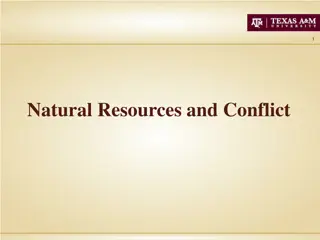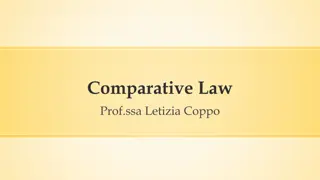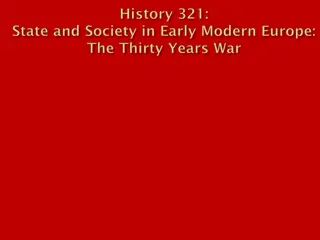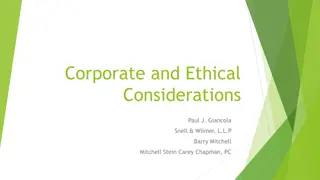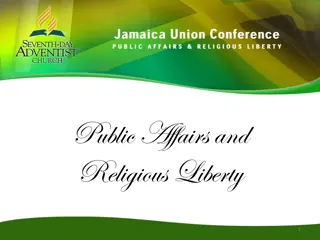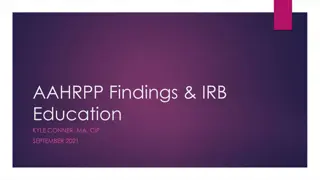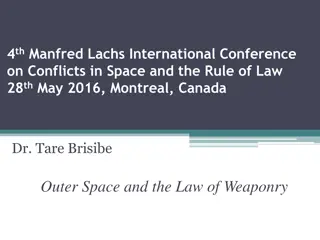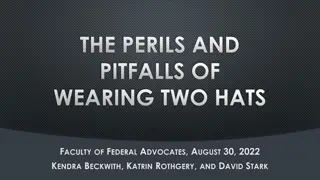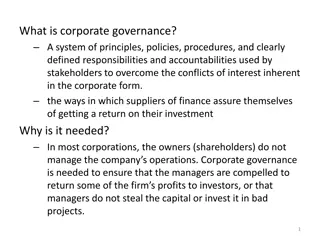Global Challenges Faced by Unreached People Groups
The top 20 unreached people groups face significant geographical, urban, ideological, social, and people challenges. The 10/40 Window encompasses areas with the highest concentration of unreached populations. Urbanization, diverse belief systems, social issues, and the lack of Christian presence con
0 views • 37 slides
Future Challenges and Opportunities in the Asia-Pacific Region
The rapid acceleration of societal development, as highlighted by Alvin Toffler, coupled with sudden and revolutionary changes in various aspects of human life, presents both prosperity and challenges. The future trends indicate increasing complexity, necessitating collaboration, interdependence, an
1 views • 20 slides
Understanding Interpersonal and Intrapersonal Conflicts in Business Administration
Exploring the differences between interpersonal and intrapersonal conflicts, this presentation delves into the meaning of conflicts, their occurrence, key topics, and resolution strategies. It highlights conflict scenarios in various settings and emphasizes the importance of effective communication
2 views • 11 slides
Understanding Critical Stylistics: Tools and Application
Critical Stylistics (CS) is a method that delves into the ideological underpinnings of texts through the analysis of linguistic features. Developed by Jeffries, CS focuses on uncovering implicit ideologies embedded in texts by examining stylistic choices. By integrating stylistics and critical disco
2 views • 28 slides
Understanding the Cold War: Phases and Perspectives in B.A. IV Semester
Cold War, characterized by economic, political, and military competition between the US and Soviet Union, stemmed from ideological differences leading to global conflicts and proxy wars in the Global South, ultimately fueling neo-colonialism and neo-imperialism.
1 views • 15 slides
Evolution of Modern Literature in the 20th Century
The Modern Age in literature emerged in response to the Victorian era, marked by a shift in attitudes towards life and society. Influenced by historical, economic, and ideological factors such as World Wars, capitalism, and the disintegration of empires, Modern Literature explored new themes and sty
1 views • 14 slides
Understanding Conservatism: Origins and Principles
Conservatism emerged as a reaction to the upheaval of the French Revolution, valuing tradition, security, and social order. It emphasizes the preservation of traditional institutions and stability, with roots in the beliefs of Edmund Burke. Key features include a focus on human imperfection, traditi
0 views • 21 slides
Terrorism: A Global Threat in International Politics
The rise of terrorism as a global menace is a significant factor in contemporary international politics. Fueled by advancements in technology and ideology, terrorism poses a formidable challenge, exemplified by events like the 9/11 attacks. Efforts are needed to combat terrorism on both national and
0 views • 24 slides
The Election of 1860: A Divisive Campaign for the Future of the United States
The 1860 election was a significant moment in American history, marked by ideological divisions and the rise of Abraham Lincoln. The Republican Party, Southern Democratic Party, Democratic Party, Northern Democratic Party, and Constitutional Union all played crucial roles in shaping the outcome. The
1 views • 14 slides
Understanding Conflicts of Interest in Public Service Governance
Preserving the integrity of public service involves actively considering and disclosing conflicts of interest before and after appointment to a board. It is essential to disclose financial benefits, relationships, and interests that may impact decision-making. Proactively managing conflicts of inter
0 views • 11 slides
Mechanism Proposal to Avoid IRM Conflicts in IEEE 802.11 Networks
This document presents a proposal to tackle IRM collision and conflict issues in IEEE 802.11 networks, particularly focusing on addressing scenarios where multiple non-AP STAs select the same IRM. The document outlines the importance of avoiding IRM conflicts, introduces the concept of IRM Recap, an
0 views • 12 slides
Community-Based Management in Watershed Development
Techniques to initiate community participation in watershed management are crucial for sustainable development. Scholars classify participation levels into different categories, highlighting the importance of ideological motivation and voluntary engagement. The shift from direct intervention to part
0 views • 28 slides
Conflict of Interest Guidelines Learning Module
This learning module created by the Dominion Leadership and Development Committee explores conflicts of interest in the context of organizational decision-making. It defines conflicts of interest, outlines when conflicts arise, and differentiates between real, potential, and apparent conflicts. Addi
5 views • 8 slides
John Proctor's Conflicts in "The Crucible
John Proctor in "The Crucible" faces conflicts with Abigail Williams, his society in Salem, and his inner demons due to his adultery. These conflicts drive the plot and showcase the struggle between personal integrity and societal expectations in a strict theocracy. Proctor's internal turmoil over h
0 views • 10 slides
The Cold War: Rivalry and Tension Between Superpowers
The Cold War, lasting from post-World War II to the 1980s, was defined by political tension and rivalry between the United States and the Soviet Union. Despite never engaging in direct military combat, both sides competed through political maneuvering and propaganda, impacting global conflicts and t
0 views • 11 slides
Empowering Organizations Through Ombuds: Conflict Resolution and Confidential Support
Ombuds are independent conflict facilitators who provide confidential and neutral support to individuals within organizations. They help address a variety of issues such as harassment, unfair treatment, and interpersonal conflicts. Ombuds empower individuals to navigate conflicts safely and offer se
0 views • 11 slides
Literary Analysis in "The Crucible": Allusions and Conflicts in Acts 1 and 2
Explore the use of allusions and conflicts in Acts 1 and 2 of "The Crucible." Uncover the significance of biblical allusions, historical contexts, and internal and external conflicts within the play. Delve into character dynamics, societal tensions, and the interplay of literary elements in this cla
0 views • 13 slides
Resolving Conflicts in Family Businesses: Insights and Strategies
Family businesses are common in India, but conflicts often arise due to differing opinions among family members. This article explores the characteristics of family businesses, common conflicts, and resolutions. Learn how lack of shared vision, succession issues, and power struggles impact family bu
0 views • 16 slides
The Unraveling of the Wartime Alliance and the Beginnings of the Cold War
The chapter delves into the breakdown of the wartime alliance between the United States and the Soviet Union post-World War II. Tensions rose as the Red Army occupied Eastern Europe and communism seemed to spread. The Marshall Plan's role in restoring Western Europe, coupled with events like the Cze
1 views • 15 slides
Sample Slide Format for COI Disclosure at Academic Meetings
This presentation provides a sample slide format for disclosing conflicts of interest (COI) at academic meetings. It includes guidelines for using Form 1-A when no conflicts exist and for using Form 1-A when conflicts need to be disclosed. The format also covers details about financial interests and
0 views • 5 slides
Unveiling the Antifeminist Tradition: Ideological Roots, Textual Sources, and Female Nature
Explore the antifeminist tradition in medieval studies through a deep dive into its ideological roots, main textual sources, and portrayal of female nature. Discover how stereotypes and satirical writings about women's perceived inferiority have persisted throughout history, informed by clerical, in
0 views • 9 slides
Understanding Ethics Laws in Public Service
Ethics laws in public service, such as the Ethics in Public Service Act in Washington state, aim to ensure state officers and employees uphold the highest ethical standards in conducting public duties. These laws set out standards to prevent conflicts of interest, secure privileges impartially, rest
0 views • 19 slides
Overview of Kankara School Children Kidnapping in Katsina State
Evaluating the security challenges in Northwestern Nigeria, focusing on the kidnapping incidents, this paper discusses the historical context of conflicts, the impact of Boko Haram insurgency, and the recent Kankara school children abduction in Katsina State. It explores the geographical and socio-d
0 views • 23 slides
Resolving Gear Conflicts Through Acoustic Technology
Novel approach using acoustic modems to mark the location of fishing gear and enable communication between fixed and mobile fishermen, addressing gear conflicts in fisheries. The system allows traps and trawls to report positions, owner information, and facilitate enforcement, promoting safe and eff
0 views • 20 slides
Trends, Theories, and Analytical Frameworks in Contemporary Armed Conflicts
This module explores current trends, theories, and analytical frameworks in contemporary armed conflicts, presented by Dr. Pter Kacziba from the Department of Political Science and International Studies at the University of Pcs. The content delves into the complexity of security and peace in an unce
0 views • 15 slides
Technological Advancement of Warfare and IHL - Changing Dynamics of Conflict in the 21st Century
The world is witnessing a transformation in conflicts due to technological advancements, globalization, and information warfare. From historical changes in warfare to the current impact of internet disruptions and global connectivity, the nature of conflicts and ways of fighting have evolved. This e
0 views • 25 slides
Natural Resources and Conflict: Stakeholders, Scarcity, and Impacts
The interplay between natural resources and conflict is examined, discussing stakeholders involved, potential scarcity conflicts, and the impact of resource abundance on conflict intensity. Examples such as Darfur highlight the complexities of resource-related conflicts. The significance of resource
0 views • 18 slides
Chinese Law: A Historical Perspective on Harmony and Legal Principles
Chinese law reflects a unique approach to social order and harmony deeply rooted in Confucian teachings. The concept of cosmic harmony and the emphasis on societal roles are central to understanding the legal framework in ancient China. Legal principles such as Li and Fa governed social behavior bas
0 views • 22 slides
Religious and Social Conflicts Fueling the Rise of Absolutism in Europe
Social, economic, and religious conflicts in Europe played a significant role in the emergence of absolutism where monarchs wielded supreme power without sharing it with legislative bodies. Events like Spain's religious conflicts, Protestantism in England, the Spanish Armada, religious conflict in t
0 views • 10 slides
European Political Landscape in the Early 17th Century
Central Europe in 1618 was marked by conflicts and power struggles among various entities such as the Bishopric of Hildesheim and the Duchy of Brunswick-Wolfenbüttel. The inability to achieve peace in 1635 and beyond was fueled by factors such as France's increasing revenue and military spending, f
0 views • 26 slides
Ethics and Conflicts of Interest in Legal Practice
The content discusses key rules related to conflicts of interest in the legal profession, focusing on the obligations of lawyers towards current and former clients. It explains the situations where conflicts may arise, and the conditions under which a lawyer may or may not represent a client in such
0 views • 36 slides
Religious Conflicts Throughout History
Religion, while promoting peace and tolerance, has also been a source of conflict leading to numerous wars and significant loss of life. This article highlights some of the most notable religious conflicts, including the Crusades, the Lebanese Civil War, and the Sudanese Civil Wars. These conflicts,
0 views • 40 slides
Understanding Financial Conflicts of Interest in Research
In this content, the focus is on the significance of Financial Conflicts of Interest (FCOIs) in research, specifically in academic medical institutions like Jefferson. The IRB's role in reviewing and managing FCOIs to protect research participants and ensure informed consent is highlighted. Areas of
0 views • 20 slides
The Manfred Lachs International Conference on Conflicts in Space and the Rule of Law
The 4th Manfred Lachs International Conference held in Montreal in 2016 explored the intersection of conflicts in space and the rule of law, specifically focusing on the legal framework surrounding outer space weaponry. Discussions highlighted the importance of upholding humanitarian values, promoti
0 views • 7 slides
Presentation Title and Conflicts of Interest Disclosure
This presentation features Presenter's Name and Institution discussing a relevant topic. The presenter declares no conflicts of interest related to the presentation content. The disclosure of potential conflicts is made transparent to ensure transparency and ethical conduct.
0 views • 4 slides
Understanding the Cold War: Origins, Consequences, and Ideological Conflicts
Explore the origins, consequences, and ideological conflicts of the Cold War through key events like the Iron Curtain, Berlin Airlift, Korean War, and Cuban Missile Crisis. Learn about communism, democracy, and the impact of beliefs and ideals on attempts to stop the spread of communism during this
0 views • 16 slides
Preventing Club Conflicts Through Active Listening
Learn how to prevent and manage conflicts within clubs by practicing active listening techniques. Understand the importance of resolving conflicts effectively for better club dynamics and member satisfaction. Gain insights on conflict resolution strategies and the impact of poor listening skills on
0 views • 43 slides
Navigating Joint Representation in Legal Practice
Exploring the complexities of joint representation in legal practice, this content delves into the perils and pitfalls of wearing two hats as counsel for multiple clients. It discusses the necessity and challenges of engaging in joint representation, conflicts of interest, and the rules governing co
0 views • 25 slides
Global Conflicts and Revolutions: A Historical Perspective
The turbulent events of the 20th and 21st centuries, from the aftermath of WWI with the Treaty of Versailles to the devastating Rwandan Genocide in 1994, have shaped our world through wars, genocides, and ideological clashes. The rise of leaders like Hitler, the tragedy of Pearl Harbor, the Korean W
0 views • 7 slides
Understanding Corporate Governance: Principles, Objectives, and Duties
Corporate governance is a system of principles and practices used to manage conflicts of interest in corporations. It ensures managers act in the best interest of shareholders. Key aspects include objectives to mitigate conflicts, ensure efficient asset use, and common sources of conflict like manag
0 views • 10 slides
